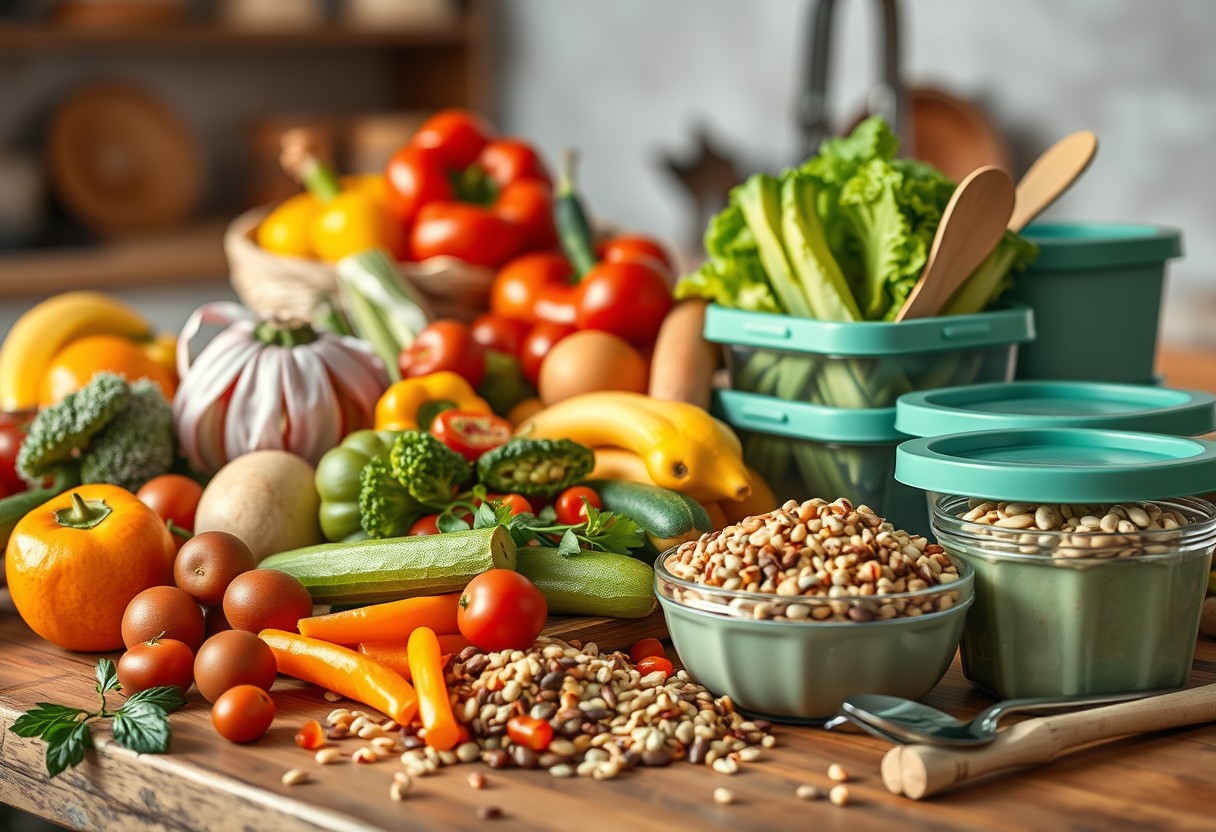This guide will assist you in embracing a zero waste lifestyle, helping you make eco-friendly choices that benefit both the planet and your everyday life. By implementing sustainable practices, you can significantly reduce your waste output and minimize your environmental footprint. You’ll discover practical tips and strategies tailored for beginners to ensure that your transition is both manageable and rewarding. For more resources, refer to the Zero Waste for Beginners Archives, where you can explore additional insights on sustainable living.
Understanding Zero Waste
To initiate on your journey towards eco-friendly living, it’s crucial to grasp the concept of zero waste and what it entails. Zero waste is more than just a trendy lifestyle choice; it’s a philosophy aimed at eliminating waste by promoting the redesign of resource life cycles and encouraging practices that favor sustainability. You may think of zero waste as a commitment to minimizing the landfill burden while maximizing the reuse and recycling of materials. This approach invites you to rethink the way you consume, focusing on reducing what you use and ensuring that everything you bring into your life has a purpose and can eventually be repurposed or recycled.
What is Zero Waste?
Any commitment to a zero waste lifestyle involves strategically reducing the waste you produce to as close to nothing as possible. This means minimizing trash at the source and emphasizing practices such as composting, bulk buying, and reusing items rather than opting for single-use products. By adopting this mindset, you can foster a more sustainable relationship with the resources you consume and help create a healthier planet for future generations.
The Importance of Going Zero Waste
One of the primary reasons to adopt a zero waste lifestyle is to combat the growing issues surrounding waste management and environmental degradation. By shifting towards zero waste, you’re taking a tangible step towards reducing pollution, conserving natural resources, and mitigating climate change. The fact that landfills are overflowing with plastic and other non-biodegradable materials presents a pressing challenge, and your contributions can help in dramatically lowering this impact. Choosing to engage in eco-friendly practices not only benefits the environment but also promotes a healthier and more sustainable community.
Going zero waste also encourages mindfulness in your consumption habits. As you reduce waste, you become more aware of the items you really need versus the ones that serve only to clutter your life. This newfound consciousness empowers you to make more intentional choices that align with your values and ultimately lead to a more fulfilling lifestyle.
Common Misconceptions about Zero Waste
There’s a plethora of myths surrounding the zero waste movement that can deter you from adopting this sustainable lifestyle. Many people mistakenly believe that going zero waste is an all-or-nothing endeavor, leading them to feel overwhelmed or discouraged before they even begin. In reality, zero waste is about making incremental changes and adopting better practices over time. Every small step counts, whether it’s refusing a plastic straw or bringing your own reusable bags when shopping.
Additionally, some may think that living a zero waste lifestyle requires significant time, money, and resources, but that’s not necessarily true. You’ll find that many zero waste solutions are simpler and more cost-effective than their traditional counterparts. By creatively reusing items and minimizing excess purchases, you can actually save money while adopting a sustainable lifestyle.
Zero waste living is a transformative journey that focuses on mindful consumption according to your values rather than perfection. Embrace the process and celebrate your progress, for every small change you make contributes positively to our planet’s future.

Getting Started with Zero Waste
Any journey towards zero waste requires self-reflection to understand where you currently stand regarding waste production. Before stepping into the changes you want to implement, it’s important to assess your current waste production. Start by keeping a waste diary for a week. Document the items you throw away and categorize them into sections like food waste, plastic, paper, and other materials. This process will shine a light on your patterns and help you identify the major contributors to your waste stream. To learn more about this process, check out How to Go Zero Waste (a beginner’s guide) – Wake Up to Waffles.
Assessing Your Current Waste Production
Waste assessment is an important first step in your zero waste journey. Take the time to evaluate not only what you are throwing away but also your habits that could lead to waste generation. Are you purchasing unnecessary items? Is your food going to waste? By recognizing these patterns, you can create a clearer path towards improvement and taking meaningful steps for sustainability.
Setting Achievable Goals
If you’re committed to embracing a zero waste lifestyle, setting achievable goals is vital. Rather than attempting to change everything at once, choose a few specific areas where you can immediately reduce waste. For instance, you might focus on minimizing single-use plastics, or you could aim to compost food scraps. By breaking your journey into manageable tasks, you make your goals less overwhelming and more feasible.
Your goals should be SMART—Specific, Measurable, Achievable, Relevant, and Time-bound. For example, instead of saying “I want to be zero waste,” you could set a goal like “I will reduce my plastic usage by 50% in the next three months.” This approach allows you to track your progress and celebrate small victories along the way, motivating you to continue on your journey toward a sustainable lifestyle.
Essential Tips for Your Zero Waste Journey
Any zero waste journey will come with its ups and downs, but with the right strategies in place, you can navigate these challenges. Start by opting for reusable products, such as water bottles, coffee cups, and shopping bags. Try to purchase second-hand items whenever you can, as this not only reduces waste but also saves money. It’s also useful to educate yourself about the materials that can be recycled or composted. Having this knowledge at your disposal can streamline your decision-making process.
- Involve your friends and family in your zero waste mission.
- Stay informed and engaged in the zero waste community through workshops and social media.
- Make a list of sustainable alternatives for everyday items you can switch out.
Recognizing that this is a journey rather than a destination will help you maintain your motivation. It’s about progress, not perfection. As you learn and adapt, don’t be too hard on yourself; every small effort counts.
Your Ongoing Commitment
Journey towards zero waste is a continuous process that evolves as you learn more about sustainability. To stay on track, consider setting routine check-ins for yourself, like monthly evaluations of your waste production or bi-weekly reflections on your goals. You may also want to join online groups or local meet-ups focused on eco-friendly practices to share ideas and support one another.
- Review your waste diary regularly to measure progress.
- Experiment with DIY alternatives for cleaning and personal care products.
- Graciously accept feedback and ideas from the community to enhance your journey.
Recognizing the importance of this commitment fosters a mindset of continuous improvement, allowing you to adapt and strengthen your efforts in reducing waste.

Practical Tips for Everyday Living
Keep in mind that transitioning to a zero waste lifestyle is a journey, and every small change you make contributes to a more sustainable future. Here are some practical tips to incorporate eco-friendly practices into your everyday life:
- Use reusable bags for shopping to eliminate plastic waste.
- Invest in a water bottle and coffee cup to reduce single-use plastics.
- Choose bulk items whenever possible to minimize packaging waste.
- Practice mindful consumption and only purchase what you truly need.
- Make efforts to repair items rather than discarding them.
Any effort you make towards living sustainably will help reduce your carbon footprint and contribute to a cleaner environment for future generations. By incorporating these simple changes into your daily routine, you can pave the way for a more eco-conscious lifestyle.
Composting at Home
Any food scraps you generate can have a second life through composting. It’s an excellent way to reduce waste while enriching your garden soil. Start by setting up a compost bin in your backyard or using a kitchen compost container for smaller spaces, such as apartments. You can compost fruit and vegetable scraps, coffee grounds, eggshells, and yard waste—just avoid meat, dairy, and oils to keep your compost healthy and pest-free.
Composting not only diverts organic waste from landfills but also creates a nutrient-rich resource for your plants. You’ll find that gardening becomes more rewarding as you nurture your plants with homemade compost. Plus, caring for your own compost heap can provide you with insights into waste breakdown and the natural cycle of nutrients.
Sustainable Shopping Practices
Some of the most impactful changes in your zero waste journey can occur when you shop. Aim to purchase items in bulk to reduce packaging waste. Bring your own containers, jars, or cloth bags to refill with grains, nuts, or spices. Select products made from sustainable materials or conveniently pack less—favoring companies that prioritize eco-friendly practices is necessary.
Another major aspect of sustainable shopping is supporting local businesses and farmers’ markets. This not only helps the economy but also reduces the carbon footprint associated with transportation. Every purchase you make is an opportunity to support environmentally conscious brands and practices.
To further enhance your sustainable shopping, consider researching brands before you buy. Check for certifications or claims that align with your values. This is a great way to become educated on ethical practices, often allowing you to make informed choices that benefit both the planet and local communities.
DIY Solutions for Common Products
Living sustainably opens up a world of DIY possibilities that not only help reduce waste but also save you money. You can create your own cleaning products, personal care items, and food wraps with simple ingredients found in your kitchen. For instance, combining vinegar and baking soda can produce effective cleaning solutions, while beeswax wraps can substitute plastic wrap.
Engaging in DIY projects fosters creativity and makes you more aware of the materials you use. It can be gratifying to make your own products, knowing exactly what goes into them. Plus, you can tailor your creations to meet your specific needs and preferences.
Solutions to common household waste can often be found in natural alternatives. Experimenting with recipes for DIY products can lead to healthier options that avoid harmful chemicals and excessive packaging. Many online resources can guide you through fun and effective recipes to start on your DIY journey.
Mindful Consumption
With mindful consumption, you’ll become more aware of your purchasing habits and their impact on the environment. Take time to reflect before making a purchase: Do you really need this item? Is it made sustainably? By asking these questions, you cultivate a habit of thinking critically about your buying decisions.
This practice helps prevent impulse purchases and reduces overall waste. You can also apply this mindset to gifts, opting for experiences or homemade items rather than material goods. The more you embrace mindful consumption, the more sustainable your lifestyle will become.
The goal of mindful consumption is not just about reducing waste but fostering a deeper connection with the products you choose to bring into your life. By prioritizing quality over quantity, you will not only be kinder to the planet but also invest in your well-being.
Factors to Consider for Long-Term Success
All effective zero waste journeys require consideration of various factors that can lead to long-term success. Being aware of these factors will not only enhance your commitment but will also provide a structured approach to your eco-friendly living. Here are some important elements to keep in mind:
- Prioritize education about zero waste practices.
- Identify your lifestyle habits and their impact.
- Consider your local recycling and composting programs.
- Establish realistic goals that suit your lifestyle.
- Stay informed on sustainable products and alternatives.
Any thoughtful consideration can significantly improve your chances of success as you strive towards a zero waste lifestyle.
Building a Support System
Support systems play an crucial role in your zero waste journey. Engaging with like-minded individuals can provide you with motivation, knowledge, and inspiration. Whether it’s joining a local eco-friendly group, participating in workshops, or simply connecting with friends who share similar interests, building a community will make the process less daunting. They can help hold you accountable and celebrate your milestones with you.
In addition, consider leveraging online platforms for support. Numerous forums and social media groups have emerged centered around zero waste living, where you can ask questions, share experiences, and gain advice from those further along in their journeys. A solid support system can serve as a foundation that bolsters your confidence and determination to live an eco-friendly lifestyle.
Tracking Your Progress
Tracking your progress is crucial in maintaining motivation and assessing your journey effectively. By documenting your achievements, you can identify areas for improvement and celebrate the milestones. Utilizing journals or digital tools to record your waste reduction efforts will help clarify how your habits evolve over time. This self-reflection can also guide you towards making informed decisions and adjustments in your lifestyle.
Another aspect of tracking is to regularly evaluate your waste output. You might consider creating a waste diary to visually represent the types and amounts of waste you generate. This exercise can not only illuminate the biggest sources of waste in your life but also highlight your progress in minimizing them. Make sure to set specific goals and revisit them periodically to ensure you stay on track.
Adapting to Life Changes
For many, the path to zero waste is not linear; it involves navigating through various life changes. Your habits, lifestyle, and even your home environment may alter, presenting new challenges and opportunities in your quest for sustainability. Embrace these transitions as a part of your journey, as they can provide invaluable lessons that contribute to your overall progress.
It’s important to remain flexible and adjust your strategies as needed. For example, if you move to a new city where recycling options differ from your previous location, you’ll need to research local regulations and practices. Recall, adapting doesn’t mean giving up; it means evolving your methods to fit your life while remaining committed to your zero waste goals.
Final Words
Drawing together the vital elements of adopting a zero waste lifestyle, remember that every small change you make contributes to a larger impact on the environment. Start by evaluating your daily habits and identifying areas where you can reduce waste, whether it’s opting for reusable bags and containers or choosing products with minimal packaging. You don’t need to implement all changes at once; instead, you can gradually incorporate sustainable practices into your routines, ensuring that they become natural parts of your everyday life.
As you initiate on your eco-friendly living journey, keep in mind that the goal is progress, not perfection. Celebrate your accomplishments, no matter how small, and continue to educate yourself and inspire others in your community. By committing to a zero waste lifestyle, you not only enhance your own life and mental well-being, but also contribute to a healthier planet for future generations. Your choices matter, and with each sustainable decision, you are helping pave the way for a greener, more sustainable world.



